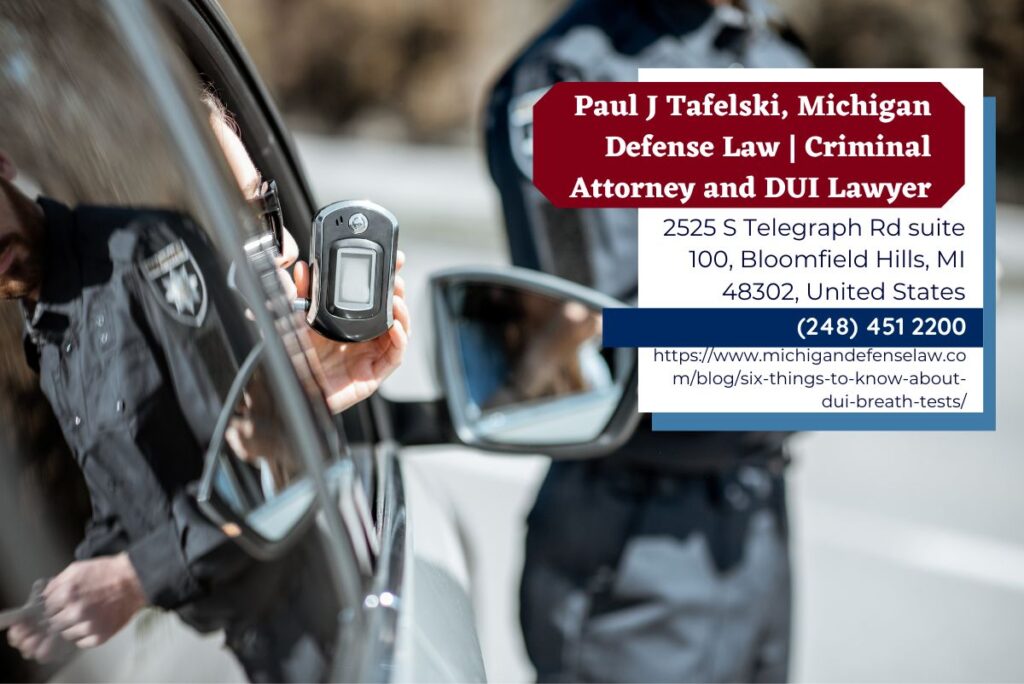If you are arrested for drunk driving in Michigan, you are required to take a chemical test – of your blood, breath or urine – to determine your bodily alcohol content (BAC).
You can refuse to take the test. But if you refuse, your license will be immediately destroyed and you will be given a paper permit. You may drive on the paper permit until your criminal case is resolved in court.
You can appeal this suspension. But you have a limited time – 14 days – to do so.
All of this might seem harsh. But that is how Michigan’s Implied Consent Law works.
Gain insight into the crucial things you need to know about DUI breath tests and receive personalized guidance tailored to your case. At Michigan Defense Law, our Michigan DUI lawyers are ready to help you navigate the complexities of DUI breath tests, including roadside breathalyzer tests. We are dedicated to protecting your rights and achieving the best possible outcome for your case. Call us today at (248) 451-2200 to schedule a free consultation.

What You Need to Know About DUI Breath Tests in Michigan
- Tests to determine BAC – especially roadside breath tests – have flaws. Roadside test devices are not always accurately calibrated.
- There are similar problems with Breathalyzer tests administered at the police station. The Breathalyzer machine must be adjusted properly and kept absolutely clean. The results may be skewed, for instance, if the police officer’s hands are unwashed.
- The police officer must give you a clear and unequivocal warning of the consequences of refusing a Breathalyzer test.
- Police officers must follow strict protocols in arresting a person for suspected drunk driving and testing them for alcohol consumption. Many officers have not been properly trained in these protocols. Sometimes they make mistakes that can invalidate the entire arrest.
- Alcohol breath tests operate on the assumption that human beings have essentially the same body chemistry, and that the machine works the same way every time it is used. These assumptions are not always accurate.
- A Michigan DUI/OWI defense lawyer can review the circumstances of your arrest to determine if you have a valid defense to the charges against you.
| Things To Know About DUI Breath Tests in Michigan | Details |
|---|---|
| Tests to determine BAC | Roadside breath tests may be flawed due to inaccurate calibration. |
| Breathalyzer tests at the police station | Proper adjustment and cleanliness of the Breathalyzer machine are crucial for accurate results. |
| Consequences of refusing a Breathalyzer test | Police officers must provide a clear warning about the penalties for refusing a Breathalyzer test. |
| Protocols in arresting and testing for alcohol | Some officers may lack proper training, leading to mistakes that could invalidate the arrest. |
| Assumptions of alcohol breath tests | Breath tests assume similar body chemistry and consistent machine performance, but this isn’t always true. |
| Consultation with a Michigan DUI/OWI lawyer | A defense lawyer can assess the arrest circumstances and determine possible defenses against the charges. |
What Happens When You Refuse a Breathalyzer?
Refusing a roadside breathalyzer request from a police officer in Michigan is not considered a criminal offense. However, it is considered a civil offense, which incurs a fine of up to $150, along with associated court costs. Refusing the test does not carry any additional penalties or affect your driving record, meaning there will be no license suspension or points. The fine is comparable to that of a speeding ticket. It’s important to note that while the results of a preliminary breath test can be used as probable cause for a drunk driving arrest, they cannot be presented as evidence during trial.
Upon being arrested for drunk driving in Michigan, it is required for you to undergo a chemical test to ascertain your blood alcohol concentration (BAC). The most common test administered is the Datamaster Breathalyzer, although an officer can choose to request a blood test instead. These additional tests are governed by the implied consent law, to which all licensed Michigan drivers agree when obtaining their licenses. Failure to comply with a chemical test is regarded as a violation of the implied consent law and entails administrative consequences.
When a driver declines a chemical test, a report of refusal is submitted to the Michigan Secretary of State after charges are filed. The driver then has a 14-day period to contest the charge. Failing to respond within this timeframe results in an automatic addition of six points to the driver’s license and a one-year suspension. If a driver has previously refused a chemical test within the past seven years, a second refusal leads to an automatic two-year license suspension without the right to appeal.
It is crucial to understand that the penalties and consequences can differ depending on the unique circumstances of your case and any previous convictions you may have. Consulting with a Michigan DUI lawyer who can provide personalized guidance based on the most up-to-date laws and regulations is crucial. Contact us and schedule a free consultation with Michigan Defense Law today.
from Michigan Defense Law https://www.michigandefenselaw.com/blog/six-things-to-know-about-dui-breath-tests/

No comments:
Post a Comment